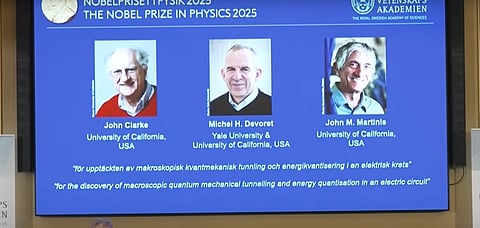

John Clarke, Michel Devoret, and John Martinis have been awarded the 2025 Nobel Prize in Physics for their pioneering experiments in the 1980s that demonstrated quantum mechanics' influence on everyday objects.
Their work with superconducting electronic circuits revealed quantum behaviors at a human scale, laying the foundation for advancements in digital technologies.
The trio’s experiments showed that quantum mechanics, typically observed in atoms and subatomic particles, could impact larger systems under specific conditions.
Their research bridged the gap between the subatomic and human scales, demonstrating phenomena like quantum tunneling, where particles pass through barriers that seem impenetrable.
This work has been instrumental in developing technologies such as ultra-sensitive sensors used in MRI machines and has potential applications in quantum cryptography and computing.
The Nobel Committee highlighted the significance of these findings for next-generation quantum technologies.
Quantum computers, which leverage quantum principles for complex calculations, could revolutionize fields like climate change research, though challenges remain in improving chip accuracy.
The laureates’ work also supports advancements in sensors for detecting faint phenomena and cryptography for secure communications.
Clarke, a professor at UC Berkeley, Devoret, a professor at Yale and UC Santa Barbara, and Martinis, a former Google Quantum AI leader and UC Santa Barbara professor, have significantly influenced the trajectory of quantum technology development.
The Nobel Prize, awarded by the Royal Swedish Academy of Sciences, includes a shared prize of 11 million Swedish crowns ($1.2 million).
The physics prize, the second Nobel announced this week, follows the medicine prize and precedes awards in chemistry, literature, peace, and economics.
The ceremony will take place on December 10 in Stockholm.